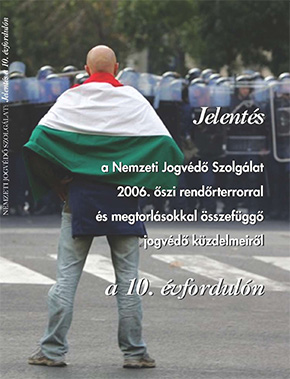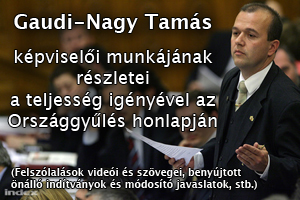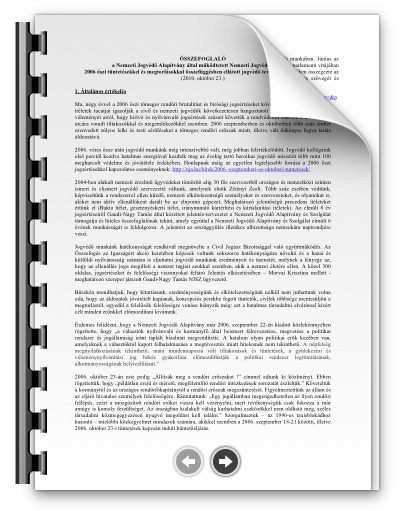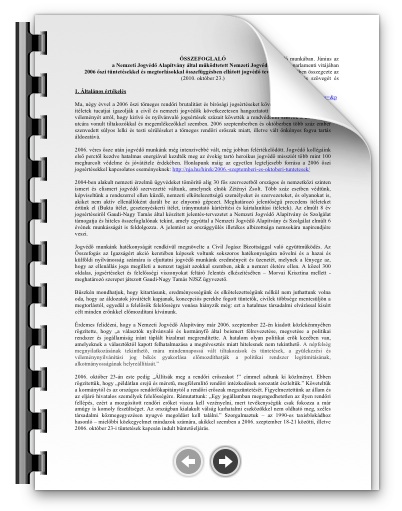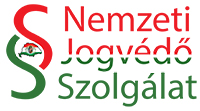Gaudi-Nagy Tamás a Nyugat-európai Unió Közgyűlésén: Európa számára biztonsági garancia a székely önrendelkezés biztosítása
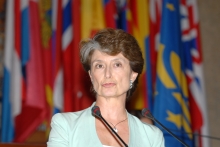 Gaudi-Nagy Tamás a Jobbik országgyűlési képviselője, a magyar Országgyűlés teljes szavazati jogkörrel bíró delegáltjaként a Nyugat-Európai Unió (NYEU) európai biztonsági és védelmi közgyűlésének decemberi ülésszakán székely önrendelkezés érdekében szólalt föl.
Gaudi-Nagy Tamás a Jobbik országgyűlési képviselője, a magyar Országgyűlés teljes szavazati jogkörrel bíró delegáltjaként a Nyugat-Európai Unió (NYEU) európai biztonsági és védelmi közgyűlésének decemberi ülésszakán székely önrendelkezés érdekében szólalt föl.
Claude-France Arnould asszony részére intézett kérdést, aki Catherine Ashton EU külügyi biztos helyetteseként látogatott el Párizsba a Nyugat-Európai Unió közgyűlésére november 30-án. Gaudi-Nagy Tamás kérdésében rámutatott: elfogadhatatlan az, hogy míg az Európai Unió a világ minden táján az úgymond demokratikus jogok érvényesítése érdekében aktív külpolitikai és biztonságpolitikai tevékenységet folytat, többek között Kongóban, Csádban és Afganisztánban és ennek érdekében önálló külügyi biztosi posztot is létrehozott az Európai Unió önálló hivatalrendszerrel, addig az Európai Unión belül egyes nemzeti közösségek, így a székelyek a mai napig nem élvezhetnek dél-tiroli modellhez hasonló területi autonómiát. A román állam a mai napig is gátolja a székely önrendelkezési törekvéseket.
Felszólalásában arra utalt, hogy jövőre Magyarország tölti be az Európai Unió Tanácsának soros elnöki tisztségét és hazánkban nagyon sokan szkeptikusak az Európai Unió biztonságpolitikájának hatékonyságával kapcsolatban. Különösen a lisszaboni szerződés óta az EU még aktívabb ezen a téren, és mégis rengeteg megoldatlan probléma van EU-n belül is, sőt a terrorizmus elleni háborúban való részvétel kockázati tényezőket jelent Európának. Részletesen kitért a trianoni békediktátum után elcsatolt magyar területeken élő magyarság sanyarú sorsára, akiknek az önrendelkezési joga a mai napig megoldatlan.
Felidézte a Székely Nemzeti Tanács magyar Országgyűlés Felsőházában november 19-én tartott történelmi ülését, amelyen a székelység legitim képviselői kinyilvánították az önrendelkezés iránti, nemzetközi jogilag is vitathatatlan törekvésüket. Rámutatott arra, hogy addig, amíg az önrendelkezést nem biztosítják a Trianonnal elszakított területen élő magyarság és különösen a székelyek részére, addig Európa biztonsága megoldatlan.
Egyidejűleg arra is kitért, hogy az Európai Unió nem lép fel kellő határozottsággal Izrael tekintetében pedig annak ellenére, hogy az ENSZ határozatait nem hajtja végre (a megszállt területekről nem vonul ki, telepeket létesít, a falat működteti és elnyomja a palesztinokat).
A főbiztos helyettese Arnould asszony – várható - válaszában arra utalt, hogy megítélése szerint az Európai Unió területén belül élő nemzeti közösségek önrendelkezésének ügye nem része az Európai Unió közös biztonság- és védelmi politikájának, ezért a tételes válasz megadása elől elzárkózott. Izrael vonatkozásában pedig csupán azt a semmitmondó választ adta, hogy az Európai Uniónak a politikai helyzet javítása érdekében meg kell tennie a megfelelő lépéseket mindkét oldalon, hogy a nehéz helyzetben lévő népek, így a palesztinok számára is megfelelő megoldás szülessen.
A válasz ismét egyértelműen arra utalt, hogy az Európai Unió nem tekinti szívügyének a magyarság önrendelkezési törekvéseinek biztosítását a már bevált európai modellek alapján. Izrael vonatkozásában az EU pedig továbbra is kettős mércét alkalmaz.
Mindenesetre ismét alkalom nyílt arra, hogy a Európa egyik jelentős fórumán a Nyugat-Európai Unió közgyűlésén napirendre kerülhetett a magyar ügy és a székely önrendelkezés ügye, és ezzel ismét megkerülhetetlenül szembesülhettek a nemzeti parlamentek jelenlevő képviselői azzal, hogy a magyar kérdés rendezése nélkül Európában elengedhetetlenül parancsoló szükség.
Gaudi-Nagy Tamás az idén júniusban tartott NYEU közgyűlésen már napirendre vitte a szétszakított magyarság önrendelkezési jogát, akkor a délvidéki magyarság számára követelt területi autonómiát, erről szóló beszámoló itt olvasható.
A teljes kérdés és a válasz angol verziója itt elérhető jegyzőkönyvben található meg:
Western European Union
European Security and Defence Assembly
59th Plenary Session:December 2010
http://www.assembly-weu.org/en/documents/sessions_ordinaires/cr/2010/cr03.php
FIRST SITTING
30 November 2010
The sitting was opened at 15.00 with Mr Walter, President of the Assembly, in the Chair
11. Address by Mrs Claude-France Arnould, Deputy Director General of the Crisis
Management and Planning Directorate, Council of the EU, representing
Baroness Catherine Ashton, EU High Representative for Foreign Affairs
and Security Policy, Vice-President of the European CommissionThe PRESIDENT - The next order of the day is the address by Mrs Claude-France Arnould, Deputy Director General of the Crisis Management and Planning Directorate, Council of the EU, representing Baroness Catherine Ashton, EU High Representative for Foreign Affairs and Security Policy, Vice-President of the European Commission.
The next question is from Mr Gaudi Nagy.
Mr GAUDI NAGY (Hungary) - I come from Hungary, which is preparing to take over the presidency of the European Union on 1 January next year. That is why many Hungarian people are involved in following movements in the security policy of the EU. Among the Hungarian and the European people, there are many sceptics about the effectiveness of the EU's security policy. Under the operation of the Lisbon Treaty, it seems that the EU is more deeply involved in standards of security and human rights not only in the EU, but all over the world - for example, Chad, the Congo, Kosovo and Afghanistan.
There are many unsolved problems. That fact really annoys people in Hungary and Europe and I wish to ask your opinion about two main topics. The first of them is within the EU. After the first world war, the Treaty of Trianon in 1920 took away more than two-thirds of Hungary, and that meant that 3.5 million Hungarian people were ousted from the country and made to live under the power of newly created foreign countries. Nowadays, their right to internal self-determination is unsolved.
A few days ago in the building of the Hungarian Parliament, the collective representatives of the more than a million Szekers who live in Romania, declared their right to have territorial autonomy, such as that held by the German people in the Trentino-South Tyrol in Italy. The Romanian Government is not inclined to ensure their rights, so the whole Hungarian problem in the Carpathian basin remains unsolved. If the EU does not solve this problem, the EU's security cannot be ensured.
The other problem occurs outside the EU.
The PRESIDENT - Please be brief.
Mr GAUDI NAGY (Hungary) - Let us consider the example of Israel. Until now, Israel has not been inclined to validate the resolution of the United Nations that it withdraw from the Occupied Territories. You should suspend Israel's right of association instead of protecting its policy of oppressing four million Palestinian people in the Middle East.
The PRESIDENT - That was two questions; I am not sure whether they were both about external action.
Mrs ARNOULD (Deputy Director General of the CMPD, Council of the EU) - The first question was undoubtedly outside the remit of the CMPD, so I will not answer it, because it is important for our member states to have a clear delineation between foreign policy, security and defence policy, and internal matters. We have always been very careful not to create the perception that CSDP is about internal policy. I know that for some of our member states, it is key to have that clear delineation. I do not say that you do not deserve an answer, but it should not be an answer from someone working on CSDP, because your question did not concern CSDP.
As for your second question, which was about Israel, it is important for the European Union to do what is in its power to support processes there in a positive way and to provide the best chances for improvement in the political situation, and in the situation of the population. There is always a balance regarding what the European Union can do to support the people, including those in very difficult situations on both sides - that includes the Palestinians - and that is not about a position of principle that would bring about a more difficult situation for the victims of the political crisis or problem.
The PRESIDENT - Thank you.

